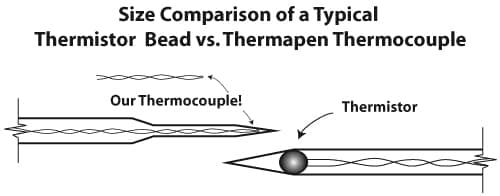Why Buy a Thermapen Instead of a Cheaper Thermometer?

Other digital thermometers found today in retail outlets use a very cheap sensor called a thermistor. The only problem with that is they're relatively slow, taking 20 to 30 seconds to read a complete temperature. Many are even advertised as "Instant Read" and some packages boast a 1 second response time. This is misleading. What they really mean is the display updates at once per second. You still have to wait until the sensor comes to the full temperature of the food you're measuring. Because a thermistor is made from carbon and epoxy; and it requires a tube size of 1/8" diameter, it really takes 20 seconds or longer to reach the full temperature. If you already have one of these, you can test its true response time by immersing it in a cup of ice water (mostly ice with only enough water to fill the gaps between the ice) and checking how long it takes to reach 32°F. You'll be surprised. Now you know how long your thermometer takes to read a temperature. You can see that if you placed it in a cooking meat, read it after 1 second, and concluded that was the true temperature; you will have a reading that is much too low and you are going to overcook that meat!
Another thing to consider is the size of a thermistor probe. Because of the diameter of the stainless steel tube and the sensor inside it, you need to immerse the probe about 5/8" to get an accurate reading. Otherwise, you'll read too low. So a thermistor thermometer is not at all useful for burgers or other thin food portions. The small needle tip of the Thermapen makes it perfect for even 1/4" thick meats!
Our Thermapen features a specially designed probe that reads a complete temperature in less than 4 seconds. This speed translates into better ability to cook and serve your food at the perfect temperature! The Thermapen uses a sensor called a thermocouple. This is the same sensor used in very expensive professional thermometers found in commercial kitchens. Such thermometers generally cost well over $100 and they are normally handheld sized units instead of pocket size. While the thermocouple sensor itself isn't too expensive to produce, the circuit required to read its temperature is complicated and more costly to produce. Our Thermapen solves both limitations by giving you a handy, pocket unit with the speed and performance of a thermocouple while still costing you $30 to $50 less!
So why would anyone ever buy a cheap thermistor thermometer? Well, pocket sized thermistor cooking thermometers are generally priced between $20 and $40. If your goal is just to make sure your food hits a minimum safe temperature and you don't mind waiting for a final reading, you can save some money. But if you really care about serving a perfect steak, making a great dough, or you hate dry poultry and fish; get a Thermapen.
